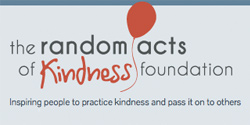Why Social Skills
Every day new research and articles are published that reinforce the importance of social skills for living a productive and satisfying life. Research has shown that everyone can benefit from improved social skills, and that organizations and societies benefit as well. When we find critical research or articles of interest on socials skills, emotional intelligence and related topics, we will continue to share these here. Also, we invite you to submit questions to our resident expert, Dr. Daniela Stamatoiu, MD, a board-certified neuropsychiatrist. You may do so by emailing your questions to jdwc@cotillion.com.
Youth
 TODAY - Don't let technology rob kids of social skills
TODAY - Don't let technology rob kids of social skills The Random Acts of Kindness Foundation - Is Technology Killing Kindness in Kids?
The Random Acts of Kindness Foundation - Is Technology Killing Kindness in Kids? Child Development - Researchers Study Victims of Bullying
Child Development - Researchers Study Victims of Bullying CNN - Study: Multitasking hinders youth social skills
CNN - Study: Multitasking hinders youth social skills NASP National Association of School Psychologists - Social Skills: Promoting Positive Behavior, Academic Success, and School Safety
NASP National Association of School Psychologists - Social Skills: Promoting Positive Behavior, Academic Success, and School Safety Milwaukee Journal Sentinel - The Importance of Minding your Manners...not just child’s play
Milwaukee Journal Sentinel - The Importance of Minding your Manners...not just child’s play The New York Times - What is Happening to Our Children? Only 37% of Parents View Kids with Hope
The New York Times - What is Happening to Our Children? Only 37% of Parents View Kids with Hope The Huffington Post - How Technology Is Killing Eye Contact
The Huffington Post - How Technology Is Killing Eye Contact Parent & Child Magazine - Why Social Skills Are Key to Learning
Parent & Child Magazine - Why Social Skills Are Key to Learning- JDWC - WHEN PARENTS ASK...what is cotillion all about?
- Richard L. Glatt, M.A. - Psychoeducational Consultant & Shelley-Anne Steinburg, M.S.W. - Clinical Associate - Social Skills equals Life Skills The Primary Determinant of Success
Adult
 TC World - Acquiring social skills - the key to professional success
TC World - Acquiring social skills - the key to professional success USA Today - Another reason to be nice: It'll get you far on the job
USA Today - Another reason to be nice: It'll get you far on the job CNN Money - Etiquette Crisis at Work
CNN Money - Etiquette Crisis at Work Woman's Day - ETIQUETTE EMERGENCIES
Woman's Day - ETIQUETTE EMERGENCIES The Wall Street Journal - How Busy Colleagues Spread Secondhand Stress
The Wall Street Journal - How Busy Colleagues Spread Secondhand Stress The Huffington Post - How Technology Is Killing Eye Contact
The Huffington Post - How Technology Is Killing Eye Contact The Wall Street Journal - How to Disarm a Nasty Co-Worker: Use a Smile
The Wall Street Journal - How to Disarm a Nasty Co-Worker: Use a Smile U.S. News & World Report - INCIVILITY IN AMERICA - How crude, rude and obnoxious behavior has replaced good manners and why that hurts our politics and culture
U.S. News & World Report - INCIVILITY IN AMERICA - How crude, rude and obnoxious behavior has replaced good manners and why that hurts our politics and culture The Denver Post - Talk sharp: Send the right message at work
The Denver Post - Talk sharp: Send the right message at work Journal Sentinel - The Importance of Minding your Manners...not just child’s play
Journal Sentinel - The Importance of Minding your Manners...not just child’s play Boston University School of Law - Soft Skills, The Importance of Cultivating Emotional Intelligence
Boston University School of Law - Soft Skills, The Importance of Cultivating Emotional Intelligence Entrepreneur.com - The Unwritten Rules of Civility 'Getting along' in the with people sometimes requires more than merely following the Golden Rule.
Entrepreneur.com - The Unwritten Rules of Civility 'Getting along' in the with people sometimes requires more than merely following the Golden Rule.- Richard L. Glatt, M.A. - Psychoeducational Consultant & Shelley-Anne Steinburg, M.S.W. - Clinical Associate - Social Skills equals Life Skills The Primary Determinant of Success

Ask Dr. Daniela Stamatoiu
Dr. Daniela Stamatoiu is a Board-Certified Psychiatrist, with extensive experience treating children, adolescents, and adults. She graduated from medical school at the age of 24, from the University of Medicine and Pharmacology in Bucharest, Romania before moving to the U.S. and completing a Psychiatric Residency at the University of Colorado Health Science Center. Dr. Stamatoiu trained in Child and Adolescent Psychiatry as well as Psychodynamic Psychotherapy at the Psychoanalytic Institute of Denver, Colorado. She began her medical career in mental health at the Colorado Mental Health Institute at Pueblo, and later joined the Psychiatric team at the Children's Hospital. Her responsibilities included evaluation, diagnosis, and treatment of children and adolescents with a variety of mental health issues. Dr. Stamatoiu can be contacted at Paramount Health Directions (303) 393-1726.
Dr. Stamatoiu has graciously been very helpful in answering questions that JDWC receives from our parents and students. If you have any questions for Dr. Stamatoiu, regarding the role social skills have in our everyday lives, please email your questions to jdwc@cotillion.com. We are looking forward to hearing from you.
- What is your definition of social skills?
Social skills are the ability to notice and process the meaning of a certain set of circumstances and in response to reasonable assessment, engaging the situation comfortably and meaningfully. As a result, self-esteem improves and the individuals progress socially and emotionally.
- What role do social skills have in defining character?
Assessing and engaging socially teaches an ongoing of others' and self needs. We practice taking other's perspectives, establishing our own, and the importance of elegantly moving between others perspectives and our own.
- At what age do children start learning social skills?
Children start learning social skills as soon as they are "socialized" at home, with siblings and family member, at daycare and/or preschool.
- How important are social skills on a child's academics? Overall education?
Engaging with other in a meaningful way (i.e. listening respectfully, maintaining eye contact, making others feel important,) will ease the learning process and create a fertile ground for growth. Our posture in a learning setting will inform our brain of the meaning of the task (i.e. if I slouch in my chair, I will feel sleepy and uninterested).
- What impact does dance have, for the first time, on a young girl and boy? At any age?
Moving in the rhythm of music starts the process of body self-awareness. Enjoying it increases comfort with yourself and lets you enjoy comfortably with others. (Ex. Learning to use body movement and senses to Tango with another individual, rather than following directions on how to Tango).
- What impact does electronic/digital communication (cell phones, texting, email and social media) have
on our children?
Aside from reasonable use for information and communication, excessive use can derail attention from social communication, learning how to regulate anxiety with others, and training eye contact.
- I think my child is too young to start cotillion. What age do you believe is appropriate for children
to start, and why?
I believe the earlier, the better. Everyone will benefit with improved social skills in settings such as a Thanksgiving table, in the classroom, in a waiting room, or at a hotel with your parents.
- My daughter was the last girl chosen when the boys invited the girls to dance. She was humiliated and
never wants to return to cotillion classes. What should I tell her?
I encourage the child to plan on how they will be the chosen one next time. It is important to learn acceptance because this example happens to everyone at some point in their lives. It will additionally teach the child the painful lesson of being rejected, but will give them empathy next time when they are the chosen one and their friend is rejected.
- What effect does a child's social skills have on dealing with (a) adversity, and (b) bullies?
Bullying is a form of others controlling you. Whatever you can do to learn self-control, comfort your physical body, and strong self-confidence will help you feel in control. Once this is achieved, others will have little room to take something away from you.
- My son never got a prize in cotillion. Why can't you give all of the students' prizes?
"There's no shortcut to anywhere we are going to." We will take away the drive and the meaning of hard work and well deserved reward. Maybe what we need to do is ask our children what they need to do to earn that prize next time.
- If you could give adolescents/teenagers any piece of advice for a successful transition to adulthood,
what would it be?
Remember that how you engage the world, and how you let it engage you will make a difference in your sense of satisfaction with results.
- What can I do as a parent to make my child more outgoing, more popular with children his age?
Does your child want to be more outgoing or popular? Maybe their idea of being in a popular group is different than your idea of being in a popular group. I would then encourage self-resilience, courage, and comfort with strengths and perceive short comings, and let it happen naturally.
- What role do social skills play in our careers? Getting a job? Keeping a job? Getting promoted?
We are social creatures. Before people know about our competence and skills they take in our way of being in the world. It is important that our very first impression is a good one.





